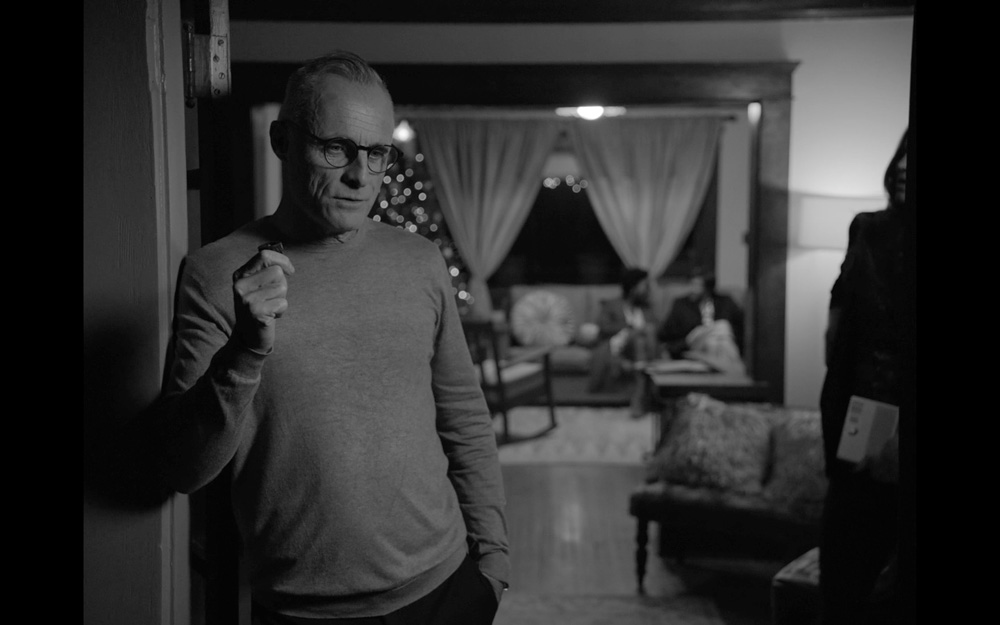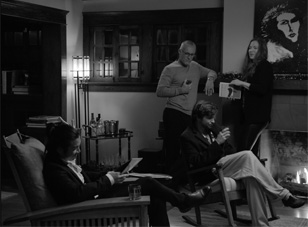When Elisha Renee Sutton arrived in Los Angeles to work in the entertainment industry, her first name was commonly mispronounced, a fact that she eventually found a use for in co-writing the feature “New Year” with her husband Nathan Sutton, who directed.
“I’ve had it Alicia, Elijah, Alisha,” she says. “That’s been going on my whole life, but it’s an L.A. thing, too.”
By the time it came around to filming, Sutton ended up taking the role of the accomplished photographer Kat, the partner of a once-revered playwright named Ben (Timothy V. Murphy), but she could surely relate to Meegan (Raven Scott), the poor soul who has come to town to be an actress yet has found that everyone is about as apt to say her name properly as they are inclined to take her seriously. The shrewd observation is one of many in “New Year,” which was brewed over the better part of a decade between friends who clearly have honed their gifts yet faced the typical vicissitudes of an unforgiving industry, leading to a film where their frustrations and their talent could combine into an irresistible drama.
Professional and personal pursuits are inextricably tied to one another in the film during a New Year’s Eve party that brings together Ben and Kat with a collection of relatives, not by blood mostly, but occupation. There are friends Willa (Gillian Shure), an agent, and Joseph (Nelson Lee), a Broadway-bound actor, and then Cameron, the father to Kat’s son Micah (T.K. Weaver), who brings along Meegan as his date, and Julian (Kyle Mac), a filmmaker who seems as if he’s become a son to Ben over the course of making a documentary that for reasons that gradually reveal themselves has never seen the light of day. Well before Micah brings out the earthquake simulation for his 4th grade project to show at the dinner table, the fault lines are made clear as differences in standing in the industry they all work in inevitably color the relationships they have at home and the film, presented in black-and-white in a tight Academy ratio frame, threatens to explode at any second as resentments build and any notion of looking towards the future on what should be a celebratory evening is dimmed by how heavy their collective past weighs on them.
Perhaps it isn’t the happiest of holiday films, but “New Year” does have some wickedly sharp repartee lighting things up and although its characters grow increasingly out of control, Sutton’s measured direction and the nuanced performances of the cast on hand keeps the intensity high. As the Suttons, as well as Lee, recently took the time to explain, the story may have been set on one night, but it was the result of years batting around ideas and swapping war stories amongst a tight-knit crew to create something memorable and with the film coming to theaters to take advantage of the impending calendar change, the trio spoke about all that the poured into it and constructing a shoot that would lead to having the most impact on screen.
Nathan Sutton: It started on a cocktail napkin in a bar with Elisha and I and another person. We had a desire to make something with our friend group, so we wrote for a handful of people that we knew based off all of our conversations that we’ve had together over the years, not specifically [to any particular people] but applied to these characters. [The characters] all the archetypes of the Los Angeles entertainment industry. We have the successful person, the on-the-rise person, the new-to-the-city with bright, green eyes [person] and everybody in between. It’s mixed with the hope that you have when you first move to Los Angeles with…
Elisha Renee Sutton: The hope that you lose. [laughs]
Elisha, did you know from the start that you would be playing Kat?
Elisha Renee Sutton: Yes, we wrote Kat for me to play, and I was just terrified. I didn’t really know that I had it in me to do it, but I’m really proud of that. I’m really happy that they made the movie and that I got to be a part of it in such a great way.
Nelson Lee: The reason I skipped on Kat was [Elisha] would not let go of the role, so I’m still a little raw about that. But, you know [Nathan’s] the director. [laughs]
It seemed to play out pretty well with you as Joseph. How did you get involved?
Nelson Lee: I’ve been friends with these two for over a decade, and it’s so interesting been a part of bringing this project over the last six years through table reads and just talking about it over drinks. It’s amazing to watch it go from the beginning to us actually showing up on sets like, “Oh, we’re doing this. We’re making a film.”
Nathan Sutton: Yeah, the table reads crafted this movie quite a bit. At some points, they were challenging [Elisha] and I because [the script] wouldn’t quite work…
Elisha Renee Sutton: We kept saying there’s something missing. There’s something missing, and we didn’t know what it was.
Nathan Sutton: Once the full cast came into place, the whole thing sings, and it really flowed.
Over the course of six years [with] us hanging out, having more conversations with more friends, we brought that into the script. We’d have these general set ups and ideas that we want to talk about, but then throughout having a better idea of who we’re writing for and who these characters are, we started to craft it and whittle it down a little bit more.
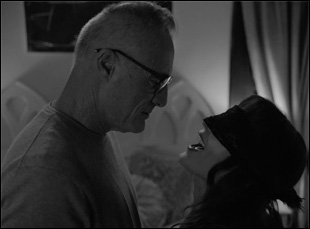
Nathan Sutton: It was a friend of mine’s house, and we had a little bit of a window from the time that he bought the house until the time that they were finishing rehab [of the property] and moving in, so we shot in that window. And once I knew that we were going to have that house, things started to get planned very specifically for every room to know where we could move a camera and keep the scenes going. Because they weren’t done with the rehab yet, if you panned left in some areas, you’re going to see bare drywall, so we tried to frame everything out as much as we possibly could and make it look like this was a house that has been lived in for 100 years.
Elisha Renee Sutton: It’s such a beautiful house that it did feel like being in a play where you’re just taken there into the time.
Nelson Lee: Any time you get to work in a real [location], a real, living, breathing house that has memories and everything imbued in it, that always plays no matter what. When you get in there, there’s a wall that you cannot move. There’s something here and that always lends to the realism and helps you get there immediately [as a character]. We did a table read in the house, and it became alive so quickly because you could just feel the energy, and people were allowed to move around the space the way we ended up shooting it.
Because it’s a single location film, could you actually shoot in sequence or was there a build to the story as you filmed it?
Elisha Renee Sutton: I had one request – that we shoot the first scene last.
Nathan Sutton:… towards the end of the film so that the chemistry [between Kat and Ben] could be more alive. We had two weeks to have them get to play with each other so that first scene of the movie doesn’t feel like it’s the first time that they met. But other than that, we basically shot in sequential order all the way through, save for the last three days for the big finale scene. We only had 12 days to shoot, but to the credit of Nelson and the other actors, we were able to adapt things when it needed to be adapted and for the staging the final scene, Nelson actually had a really great suggestion that is in the movie — I don’t want to spoil for anybody, but until we could get all seven of us in a room and watch how this looks and be able to see where everybody would move naturally and what each character would be inclined to do, it didn’t come together.
Elisha Skorman Sutton: It made the movie better.
Nathan Sutton: And it was difficult because you can’t change your days, you just have to be able to go in with a full plan and be able to adapt to whatever the environment is going to give you at that last minute.
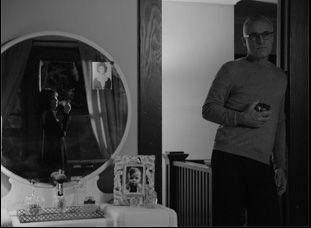
Nelson Lee: I had been a part of [the project] from a long time ago, so it was just exciting to be a part of it. But it’s a great entrance to come in since we did do it in order, it was a while where I wasn’t working. We had three days of rehearsal, and then we shot for the first week and I could see you guys were excited. [It felt like] we’re in the middle of a war right now.
Elisha Renee Sutton: When Nelson and Gillian [Shure] walked in, their characters were like a breath of fresh air, exactly at the right place at the right time. I’m so glad they didn’t show up the day before because I think we needed them to be fresh in the drama.
What it was like bringing Graham Reynolds into this to do the score? It seems like you were calling your shot a bit by having Micah practice the piano throughout?
Nathan Sutton: I had always envisioned Micah playing the piano as the background music of the party, and I wanted to have a bigger band [doing the score], but you would feel like the music is coming from Micah playing the piano. Through a producer connection, we were able to land Graham Reynolds, who was just unbelievable. He elevated this movie in a way that it’s really indescribable. Once he came in and he watched the movie, he liked what we were doing, and he sent me a couple pieces [first] and then he sent me the score, and I was literally in tears when I first heard it because I don’t know how he did it, but at this point, they’re inseparable to me — I can’t hear the score without seeing the movie, and I can’t see the movie without hearing the score.
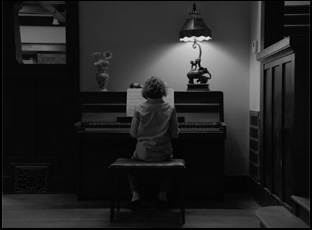
Elisha Renee Sutton: It’s a little scary when you make a piece of art because you don’t know how people are going to receive it, and you’re just making the thing that you set out to make. You put your heart and your soul into it, and then you have to share it with the world, so it’s like, “Oh. I’ve been here making this beautiful bread. Are people going to eat it? Are they going to like it?” But that’s not really up for us to decide.
Nathan Sutton: There’s also something called the post-feature blues that as soon as you’re done, you’re like, “I need to do another one right now,” so, we’re actively trying to get the next thing off the ground, but I think it’s incredibly unique to be able to work with some of our best friends in this capacity. We all got to make a little money and play together and do something that I think is really meaningful for all of us, not necessarily the material, but the process. The scene between Neil and Nelson is something that Elisha and I wrote specifically for them, and every time I see the scene, it breaks my heart in such a great way because this is the reason we made this movie — to get two friends who have known each other for 20 years to be able to do a scene together that, in some ways, reflects their lives. It’s art imitating life and vice versa.
“New Year” opens on December 15th in New York at the Film Noire Theater in Brooklyn and in Los Angeles at the Laemmle Monica Film Center.




